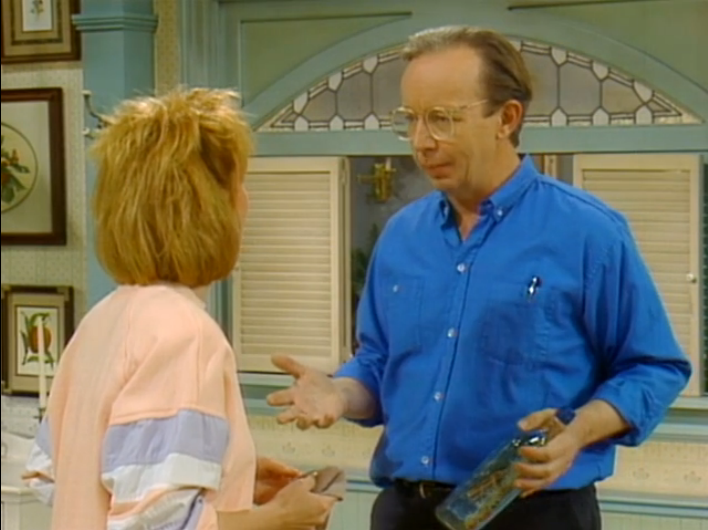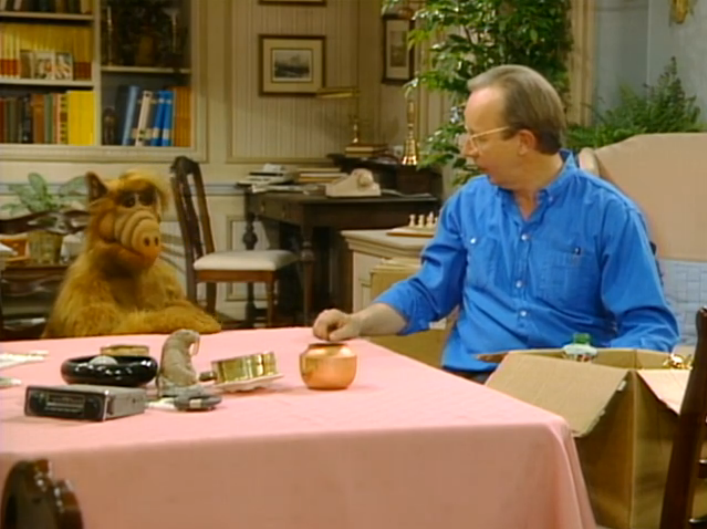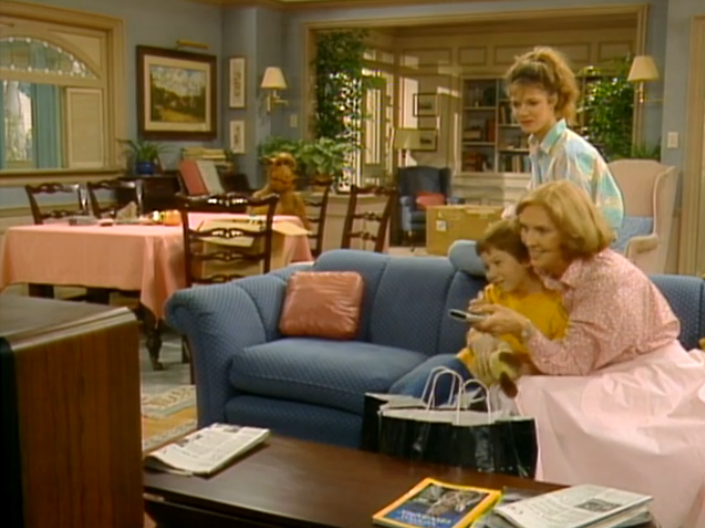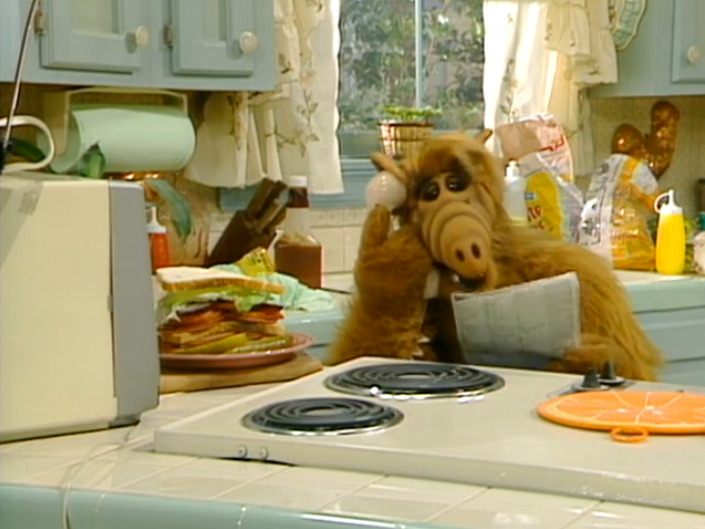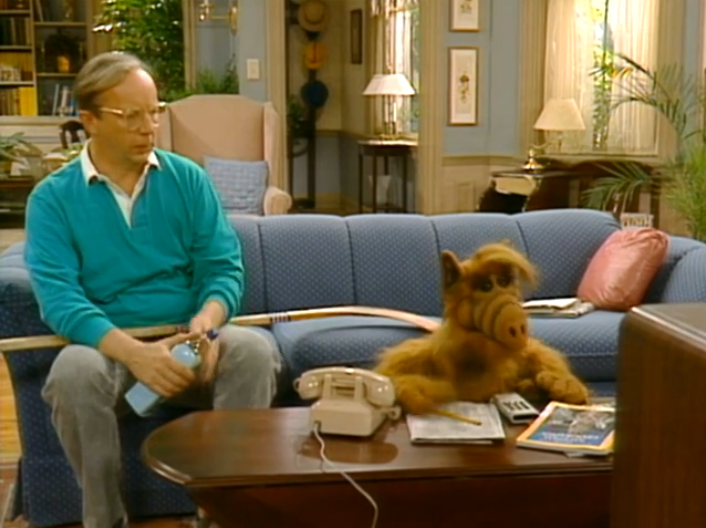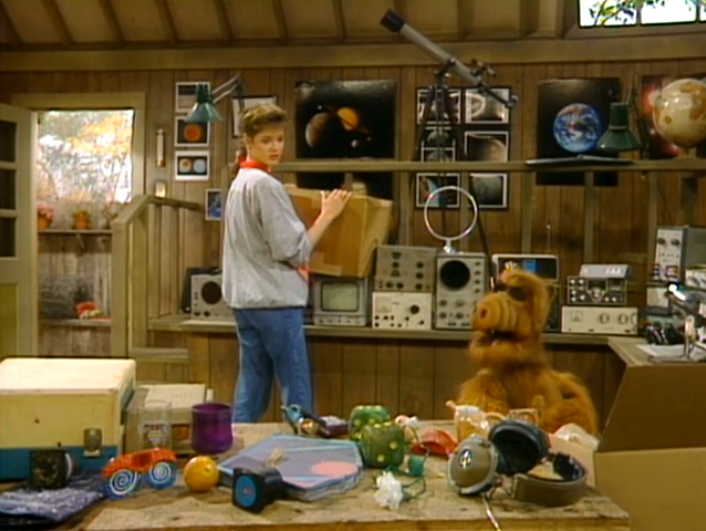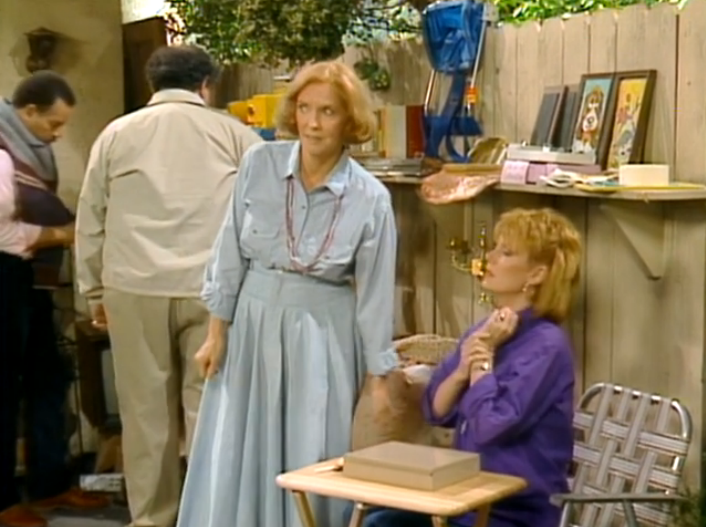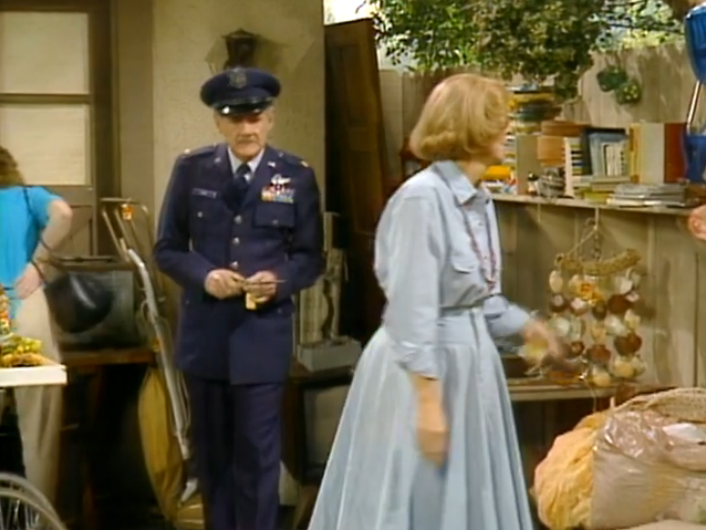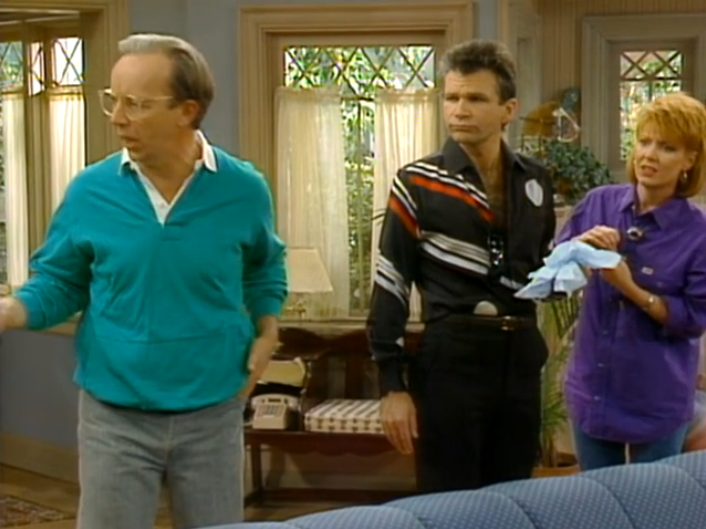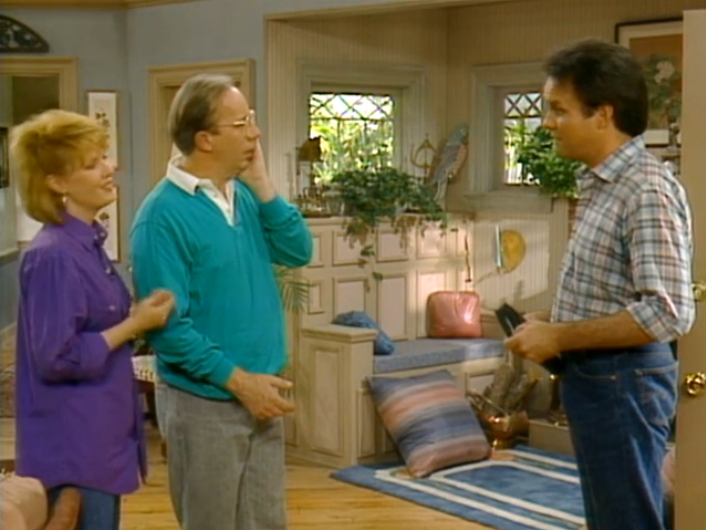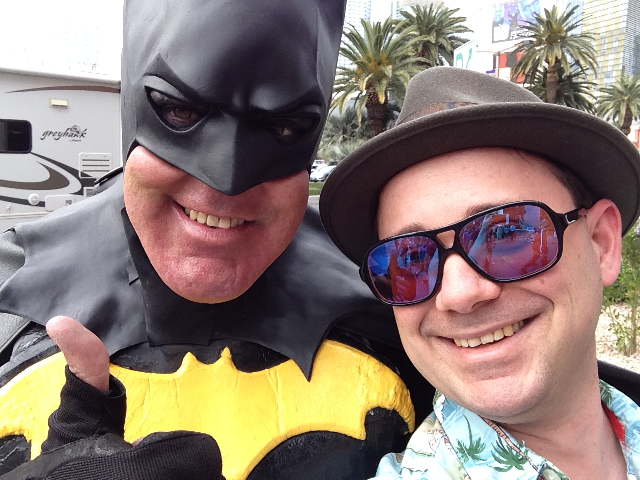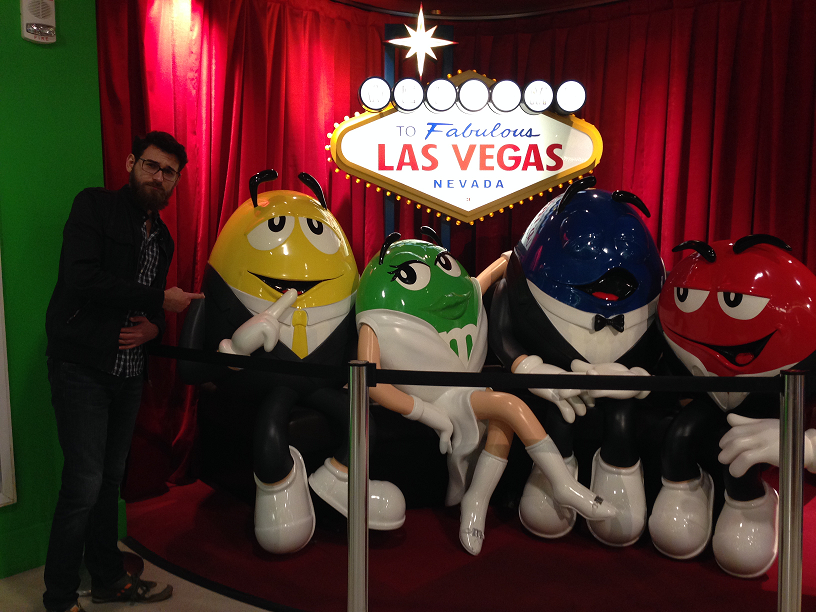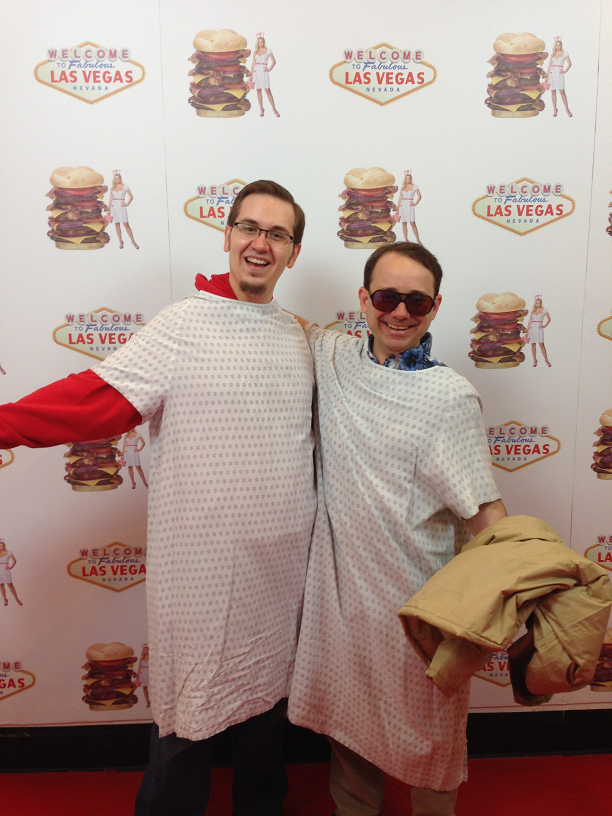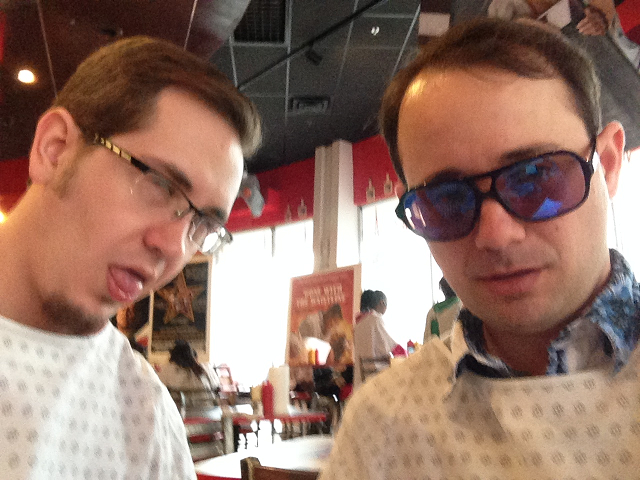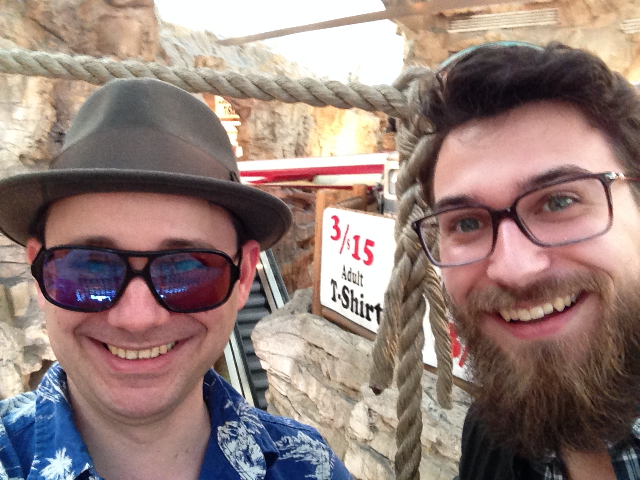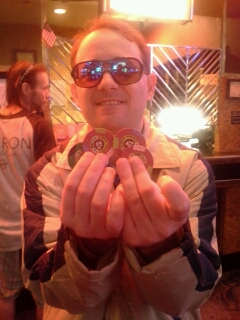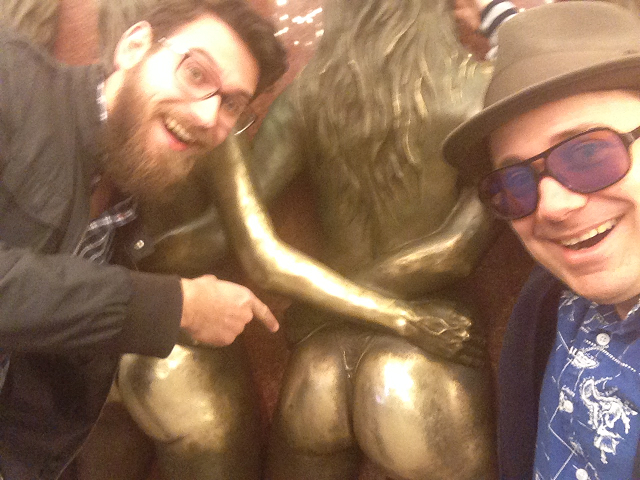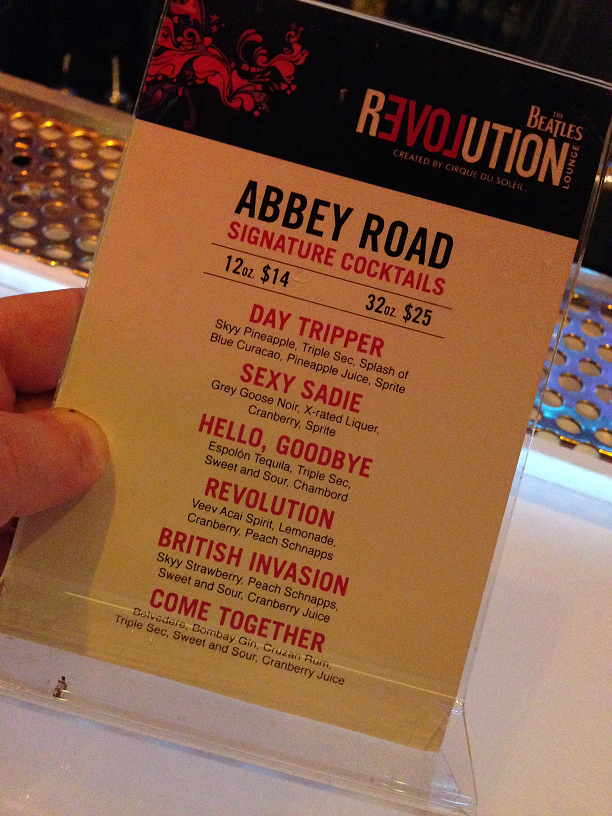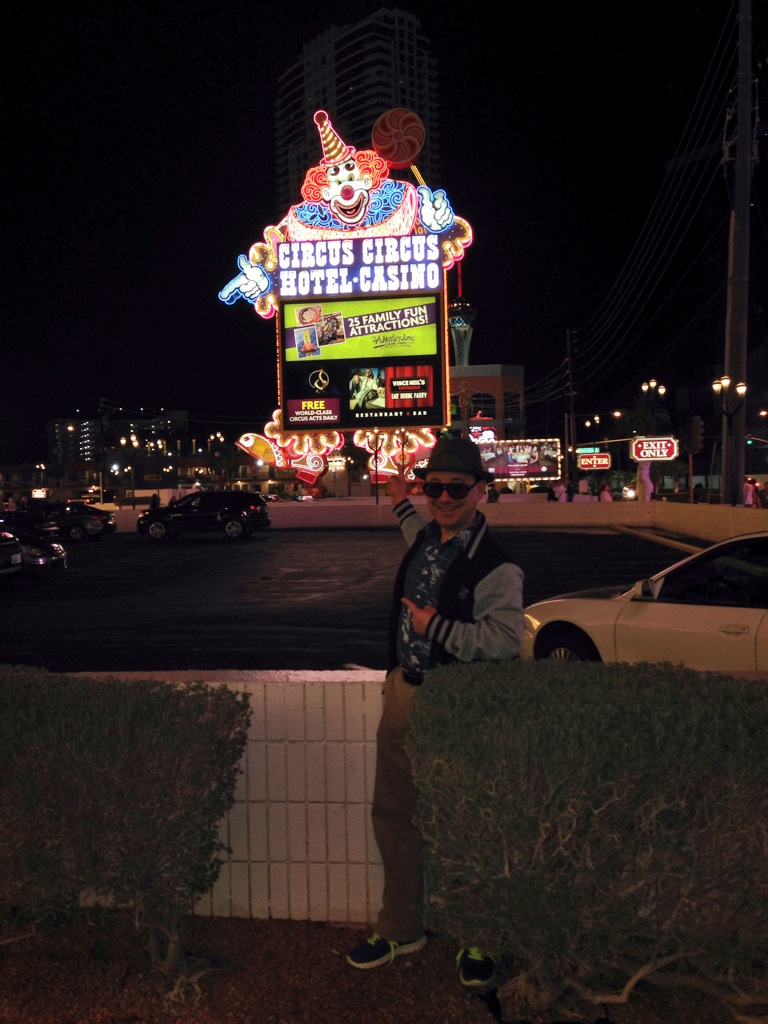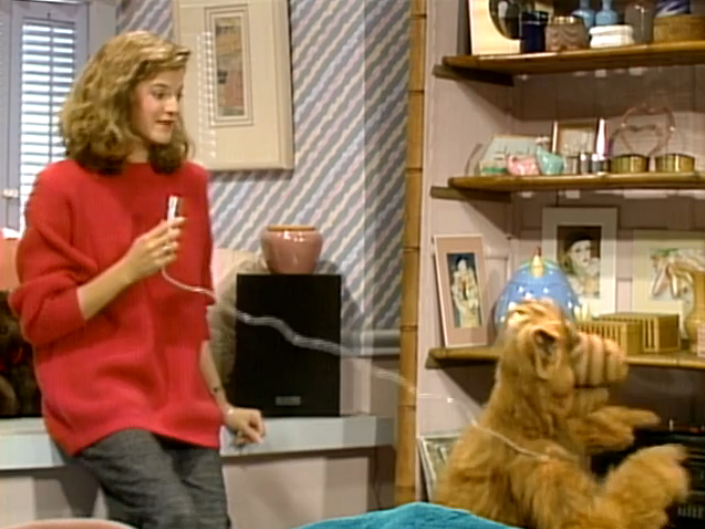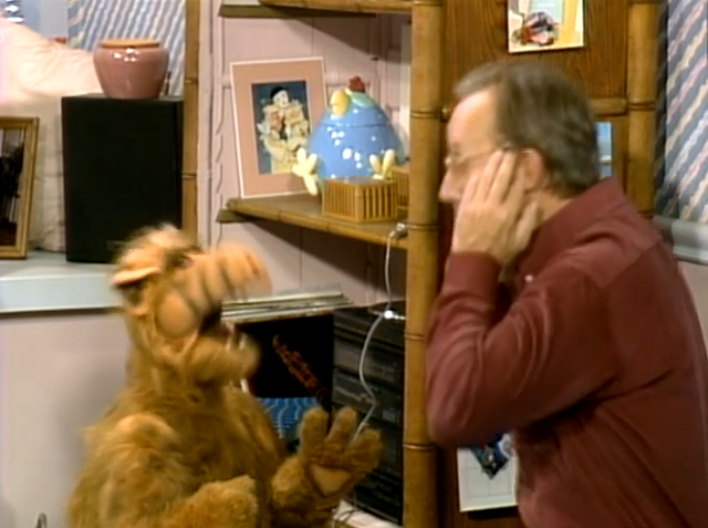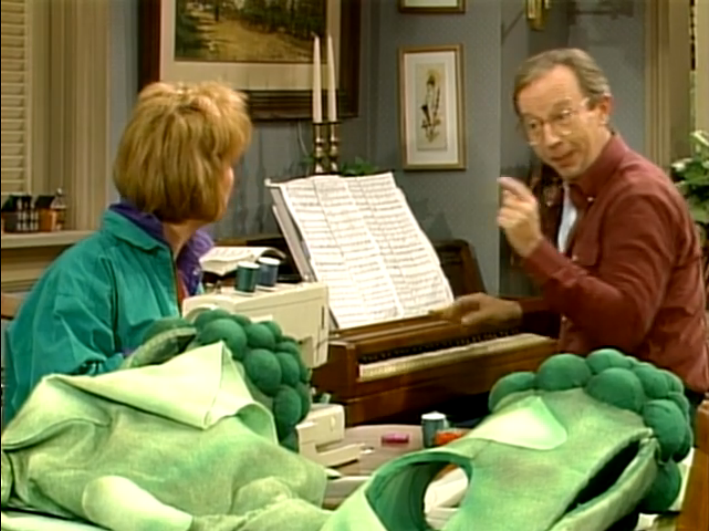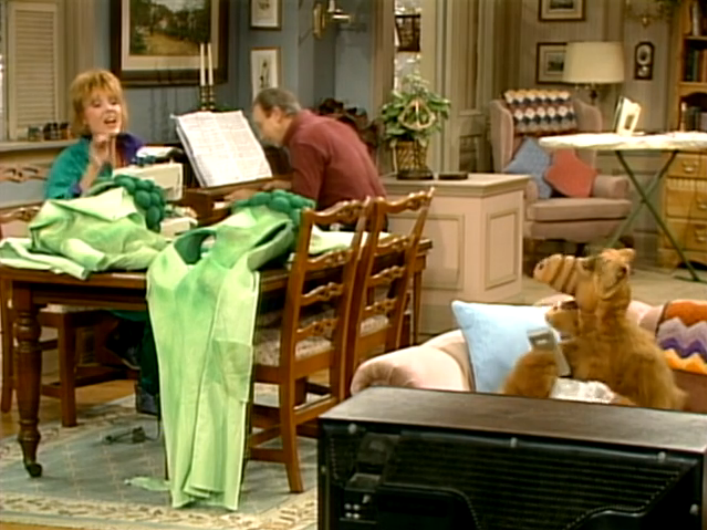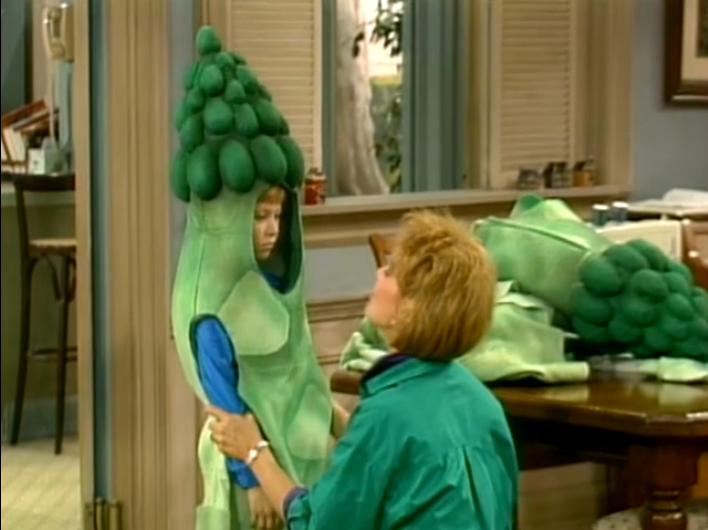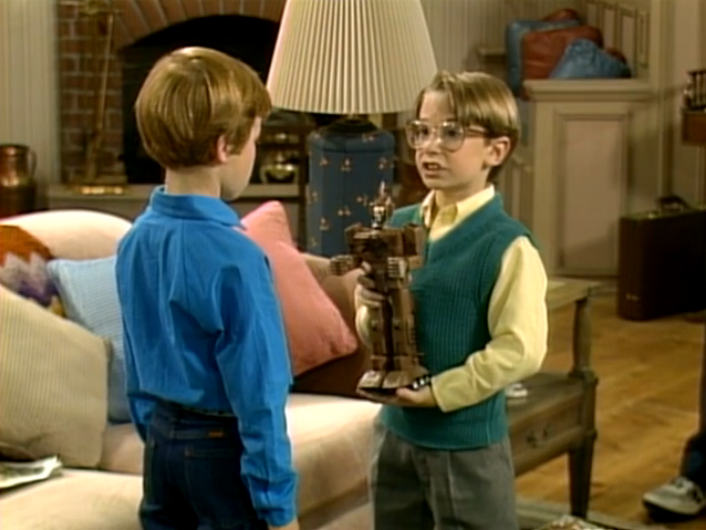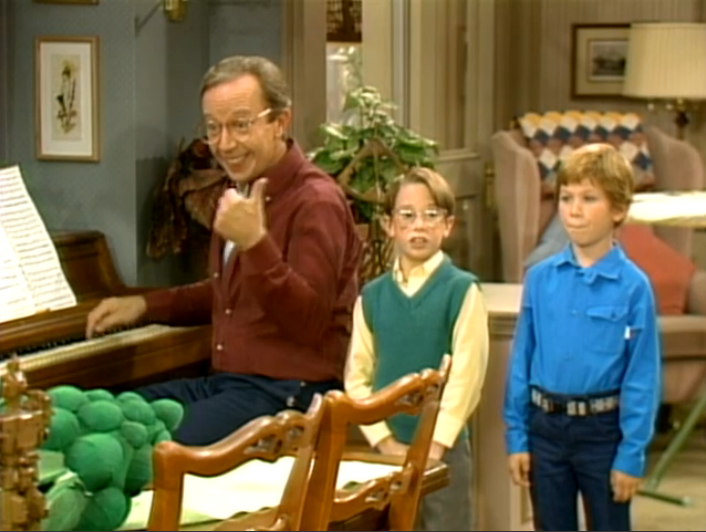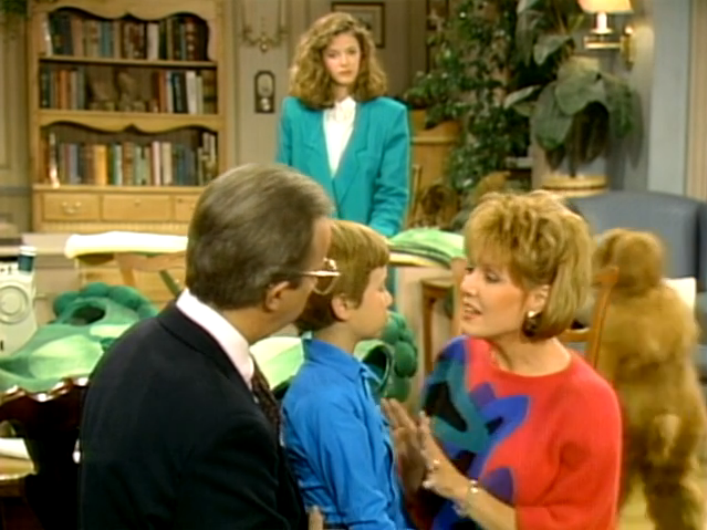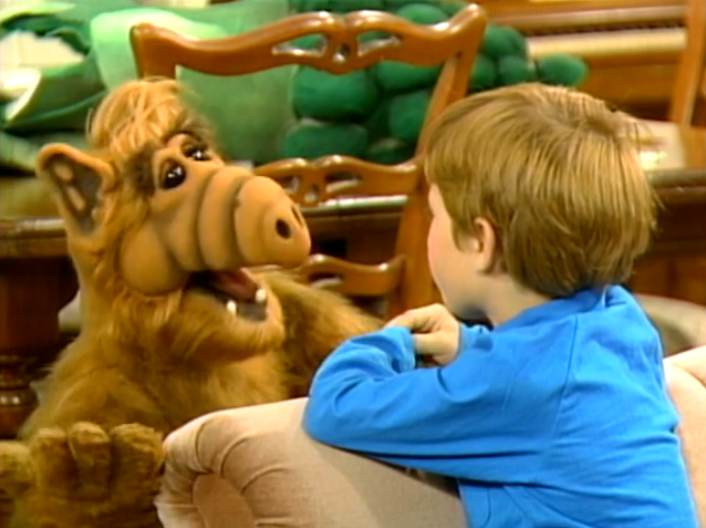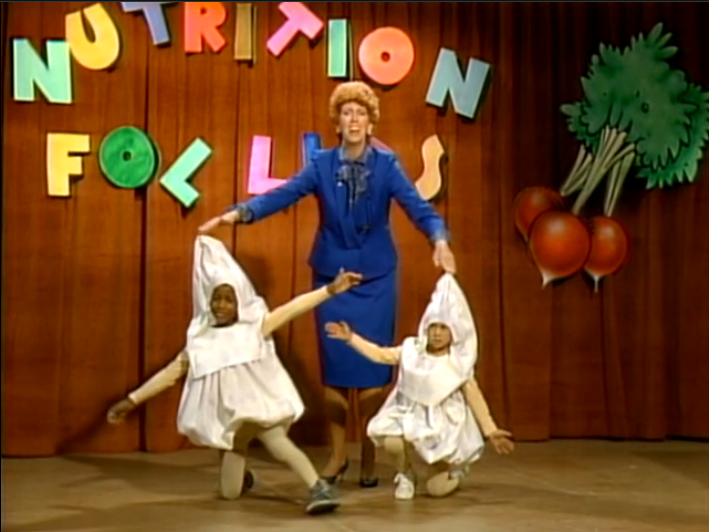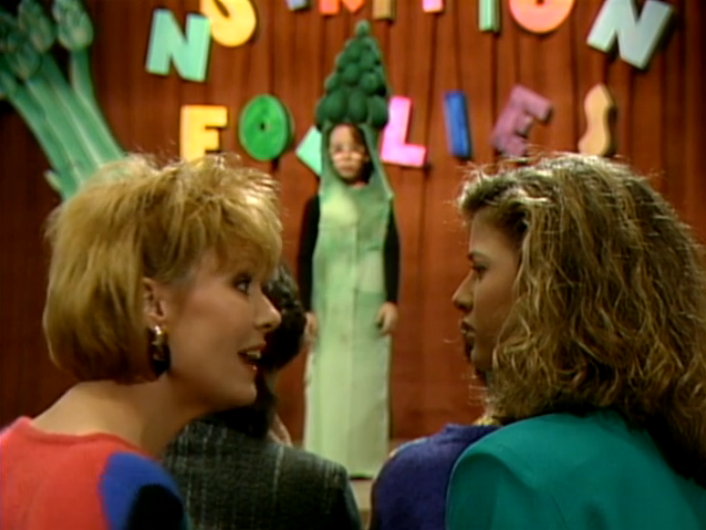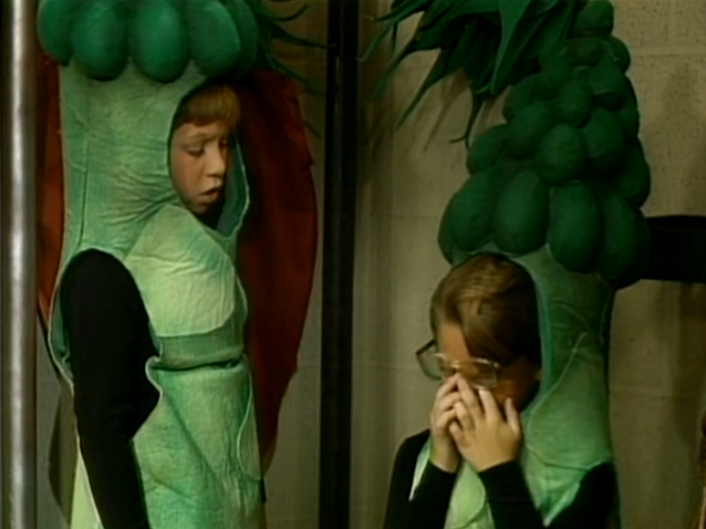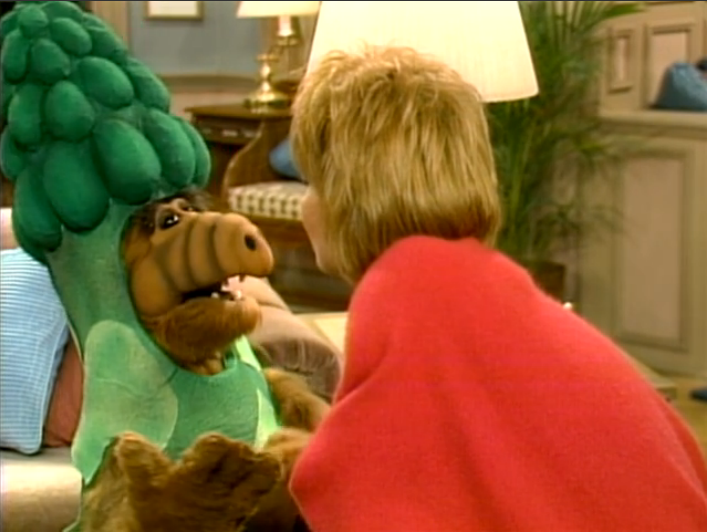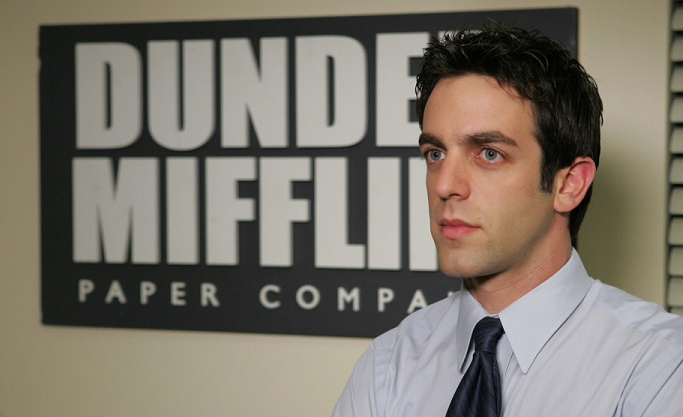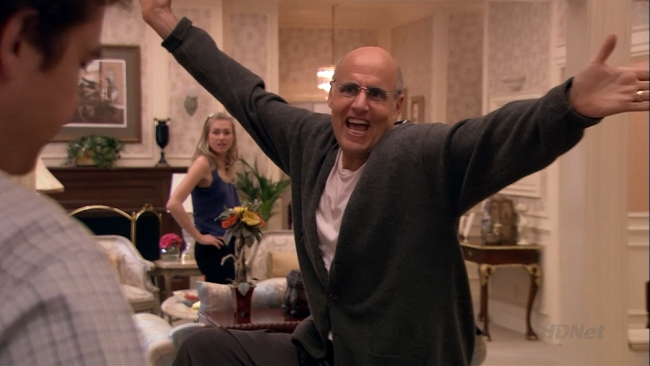When I was in Vegas I met up with Ron DelVillano, a talented artist friend who took the opportunity to question me about the ALF reviews. They were good, he said, and interesting, but he couldn’t believe I was getting so many words out of each one.
I’ll be honest: I kind of can’t believe it either. A few times I’ve deliberately tried to keep them short, but it never seems to work out that way. Each episode ends up having entire scenes I gloss over or omit entirely, and I still find myself staring at 5,000 words about some unmemorable episode of a show nobody’s cared about for two decades. I don’t know why.
This one, though, I will try to keep relatively short, simply because I don’t know how much I’ll have to say about anything apart from the ending. That’s not to say that “The Gambler” is any good before we get to the ending; it’s just…holy hell that ending.
Anyway, it starts with Willie and Kate in a tizzy because they only have a week to prepare for their garage sale. I don’t know about you, but I’ve never spent more than a few hours preparing for a garage sale. It’s not the prom; don’t you just shovel a bunch of your crap onto the lawn and trade it for pocket change? Leave it to writers of ALF to treat it like you’re preparing for the Rapture.
Willie is upset because Kate wants to sell his ship in a bottle, but we never find out why he’s so attached to it. Did he make it himself? My eyes are telling me that it’s just some chintzy thing from an airport gift shop, but I have a feeling the show wants us to believe that this is another one of Willie’s disposable hobbies.
Why can’t they give him a hobby and stick with it? It’s changing constantly. Didn’t Kate Sr. say he was always whipping up killer robots in his shed or something? Whatever happened to that? Why do we replace it with ships in bottles, skydiving, and writing songs about asparagus? I’m absolutely positive that the writers had no idea whatsoever who Willie was when this show began, and I’m pretty sure they’re ending the season without having any clearer concept of who he is, or who they even want him to be.
ALF pops up through the window that exists only so that he can have something to pop up through. He tells Willie that he read his credit card statement, and $11,000 is way too much to spend on balloons. Willie explains to him that the “balloon payment” is referring to his mortgage, but ALF keeps thinking it’s an actual balloon a million fuckin’ times even though Willie and Kate keep telling him it’s not and Jesus Christ I’m going to write another five thousand words about this shit, aren’t I?
The credits come and go* and we start the episode proper with Willie asking ALF if he understands balloon payments now. Huh? So I guess the credits sequence took the place of the conversation in which an aging white man explained the financing of the house to the alien that lives in his laundry room…but why? Was anyone watching really concerned about whether or not ALF would come to understand the concept of mortgage payments?
Last week the show didn’t bother to connect in any way the action of the pre-credits sequence to the actual episode, and though I gave it a bit of guff for that, that’s really fine. It’s a sitcom, after all, and sometimes the rigid structure creates gaps and irregularities. A good show knows how to pave over the holes, or even use them to its advantage, but this isn’t a good show. This is ALF, which for some reason believes that the one time it needs to create a feeling of more realistic progression it’s so that they can assure as that ALF now understands the intricacies of late 80s homeowner financing.
The. Fuck.
Willie moans again about having to sell his ship in a bottle, but Kate tells him they need to make space, which is why they’re having the garage sale to begin with. This thing is the size of Willie’s forearm at best; can’t it sit in a closet somewhere if he loves it so much? ALF believes that the real reason for the garage sale is that the Tanners need money — presumably because they’ve had to replace everything they own about 21 times over since his hairy dickass moved in — but even if that’s true, how much money do they think they’re going to get for Willie’s I LOVE PENSACOLA BEACH tchotchke?
Then Kate reveals that she’s going to sell Willie’s hockey stick and he goes bananas and holy shit how many never-mentioned hobbies does this asshole need? Willie Tanner has absolutely no consistent character traits. I used to believe the problem with him was that the writers wouldn’t give him any…but now I see that the problem is that they give him so many that they keep overwriting anything we’ve seen before. It’s so strange.
OH GOOD. Kate Sr. is back. I guess I shouldn’t have brought her up earlier in the review, because she heard that and rushed right over, fresh from her nooner with Wizard Beaver and with nothing else to do all day.
She sits down and turns on the horse race, telling the kids she needs to watch this. That’s fine…but why in the name of hell did she have to go all the way to the Tanner house for that? Doesn’t she have a television? Isn’t she obsessed with some dumbass soap opera? Will anybody on this show achieve consistent characterization?
Kate Classic comes in and is shocked to learn that her mother is a gambler. She asks how long she’s been gambling, and Kate Sr. replies, “My whole life,” because God fucking forbid this show suggest that anyone might develop over time.
Kate Sr. jokes about leaving all of her money to the Alien Task Force when she dies, which makes a later moment even odder than it would be otherwise, but we’ll get to that in a bit. The more pressing concern right now is the fact that civilians know that the Alien Task Force exists. Doesn’t that imply, then, that humanity within this universe knows — doesn’t suspect, but knows — that there’s extraterrestrial life? After all, if that wasn’t a given, why wouldn’t there be rioting in the streets that the government openly operates a massive entity dedicated to creatures that might not even exist? Can you imagine the shitstorm if Obama announced the foundation of the Federal Department of Sasquatch Relations?
If people know there’s an Alien Task Force, then they must also know that there are aliens. But if they know that there are aliens, then why is the Alien Task Force trying to cover them up?
It’s a chain of reasoning that isn’t debatable. If you openly operate the Alien Task Force, then everyone needs to believe in aliens, in which case there’s no need for coverups and secrecy. And if you operate the Alien Task Force in secret then we don’t need to take knowledge of extraterrestrial life as a given, but in that case you can’t have minor characters know about it and you can’t have your fucking representatives going door to door in full regalia asking if anyone’s seen the latest alien that fell to Earth.
I know I shouldn’t bother looking for logic of any kind in this show. I’m just holding out hope that somebody on the writing staff cares about this shit…and I’m disappointed almost every time.
ALF asks Kate Sr. for the name of her bookie, and then he calls him and says he wants to turn $50 into $11,000. They’re going to do all of this by mail, I guess, which is fine because sending currency back and forth through the postal service with somebody you’ve never met while betting on sports you’ve never heard of is bound to end well.
Then we cut to ALF listening to the radio and he has a lot more money now so I guess he won a bunch of times and my god who cares.
It’s actually part of a sequence set to a jaunty ragtime tune that’s supposed to suggest that ALF’s accumulating winnings over an extended period of time. So, a montage. Right?
Well, technically…but I don’t think the people working on ALF know how montages work. They’re meant to compress time so that we can skip over the boring stuff. They show the highlights, maybe a few comical moments along the way, but they are designed, essentially, to fill in the gaps as quickly as possible and get to the payoff. That’s why they’re nearly always set to music: the tempo creates a sense of momentum. We’re not just watching something…we’re moving forward.
That’s what happens when they’re employed for narrative reasons, anyway. They can also be employed for expressly artistic reasons, injecting some visual variety into a traditionally static medium. Maybe the story could be told just fine without one…but it can be told in more interesting ways with one. Breaking Bad did this regularly, and it was great at it.
Of course, you can do both at the same time. Being ALF, this show does neither.
This “montage” is just a bunch of meandering scenes stitched together in which ALF talks on the phone or monitors a horse race. It moves at no greater clip than any other given scene in any given episode, rendering the exercise redundant. It would have been easy to chop this down to an assortment of several-second scenes that showed ALF counting his money, tossing it in the air, placing more bets…you know. Something with momentum. Instead they just sit a camera on a tripod and slap music on some long scenes of a puppet poring over a betting sheet.
I don’t know. Maybe the ragtime music was laid over this sequence by some desperate editor who was charged with adding some sense of pacing to an episode rooted firmly in the mud. Even so, though, the way to do that would be to whittle down the footage he has for sharper impact…not lay some rollicking library tune over it and call it a day.
FIVE THOUSAND WORDS HERE I COME
Then it’s the day of the big garage sale! Hooray! Of course this show doesn’t have any outside sets so we won’t see any of it.
Kate Sr. comes over and says that she thinks the Ochmoneks are having a yard sale too, because they have a mess of shitty furniture in their front yard, but Kate Original Recipe delivers the punchline: it’s always that way. That would actually work as a joke if Kate Sr. had never been to the Tanner house before, but she clearly has. And, y’know, kinda lived there forever and a day.
It’s like this show goes out of its way to make no sense.
The Kates ‘n’ kiddies head outside, and Willie skulks around with his hockey stick and souvenir from some layover in a vaguely tropical region. ALF tells him to join him to watch the race, because it’s going to win him a lot of money. But the horse ALF bet on falls over. Willie leaves to re-hide his stuff, and ALF panics and calls the bookie, who says he’s coming over to the Tanner house to collect his money but why the fuck wouldn’t the bookie have asked to see the money in advance and holy cockmother in hell this is garbage.
In the garage ALF scrapes together his meager possessions in the hopes of selling them at the garage sale to pay the bookie. I don’t know if it’s attention to detail on the part of the props department or the simple fact that ALF didn’t have much of a props department, but some of the items laid out here are from previous episodes. He wore those headphones in “A.L.F.” (though I didn’t have anything to say about the scene here), he gave those green dice to Brian in “Help Me, Rhonda” (and apparently took them back…fuck you, kid), that’s his ejaculating flower from “Going Out of My Head Over You,” and those are the X-Ray Specs from “Wild Thing.” Maybe there are some other specific callbacks there that I just can’t remember.
Either way, the fact that I recognized any of it is evidence that I have wasted my life.
Oh, wow. I stand corrected; we do get to see the garage sale. I guess I forgot that they have a set for the driveway.
Nobody’s buying anything, though, and eventually Willie and Kate figure out it’s because ALF priced everything really high. How did he manage to re-price every item at the garage sale without anybody noticing? Especially since he only found out he needed that money after the garage sale began?
Anyway, Willie and Kate are pissed so they go inside to club ALF to death with his own foreleg, and there’s a really, really weird moment:
This guy was in the background during the whole scene, looking at things for sale, and then after Willie and Kate leave he approaches Kate Sr., and I really expected him to reveal himself as a member of the Alien Task Force. After all, they went out of their way to have Kate Sr. clumsily reference the organization earlier in this episode — and that’s only like the third time it’s been referenced ever — but no. It’s not even a deliberate fakeout. He’s just some guy who wears a military uniform to yardsales, I guess. He asks about a screwdriver and the scene ends.
What the actual god damn.
And that’s not even the worst thing that happens at the garage sale. No, I couldn’t begin to tell you why they dressed this extra like Colonel Klink, but something leaves me far more speechless than this ever could.
Stay tuned, dear reader.
ALF reluctantly explains to Willie and Kate about the bookie, and there’s somebody at the door so it must be the bookie because that’s the way shitty sitcoms work. But it’s not just any bookie…it’s David Leisure!
For whatever reason, ALF sure does get a lot of talent for one-off appearances. Why they didn’t cast any of these good actors and actresses in recurring roles is beyond me.
Yeah, yeah, I know David Leisure isn’t exactly Paul Newman, but he was a funny guy. He might not have had much range, but what he did he did well. I remember loving him as Charlie on Empty Nest, which he played with a genuinely charming shade of oily sleaze. And he was Joe Isuzu, in what’s got to be the most memorable advertising campaign for automobiles ever.**
Sadly, David Leisure gets stuck with a hankie and a deep voice because his character has a cold, which prevents him from putting much of his own stamp on the character. All he gets to do is demand money and sneeze. Hilarious.
Anyway, he wants $6,000 from Willie. Willie doesn’t have $6,000, so David Leisure breaks a vase and leaves. Good shit.
He’ll be back, we assume, though it’s not clear why he left. Willie then runs into the kitchen to stab ALF through the brain with a railroad spike.
They all stand around the kitchen talking about everything we just saw and repeating everything we already know, because the episode wasn’t long enough and what else were they going to fill time with? Jokes? Ha! You kill me.
ALF explains that he was just trying to help pay for the mortgage, but Willie says they have money stashed away for that, and it’s not a problem. This is actually a decent twist — ALF legitimately tries to help, but there’s no problem to begin with, which in turn results in him causing a problem — but it sure is dusted onto a damned damp squib of an episode.
Someone else comes to the door, I assume because he read my mind and knew that I thought it couldn’t get any worse.
Bitches? Bastards?
It gets worse.
It’s some guy we’ve never seen before who was at the yard sale. He says he wants to buy something he found, but he isn’t sure it’s for sale.
Willie and Kate ask him what it is. He says “the spaceship.”
So…wait. A million fucking times wait.
A fucking trillion million fucking billion fucking wait.
That’s where the space ship has been the whole time? In the bullfucking yard? Why have we never seen it? It’s just been sitting out in the open? Nobody thought to move it? Not even when they were hosting a garage sale?
They just left it clearly visible? It’s been clearly visible since episode mothertitting one?
The man doesn’t think it’s real, though…he just wants to use it as a prop for a film he’s working on, called Jupiter Guys.
But fuck all that; fuckfuck alla that fuck.
From the very first episode of this show until today the space ship has been in the yard. I wondered a while back where they could have hidden it…stupid ass idiot me!!! They didn’t hide it. They just scraped it off the roof of the garage like a dead pigeon and left it where it fell.
This is ridiculous. The people browsing their used cutlery and underpants have a clear view of the crashed UFO sitting in their yard. And it’s recognizable as a “space ship” by sight. Think about that.
Think.
About all of that.
What about that shit in “Baby, You Can Drive My Car” where ALF strips it for parts and sells the plumbing? Did that not actually happen? Is it a UFO or a pile of scrap metal?
None of this makes any sense, and it’s the grand resolution to the whole episode.
The Tanners don’t want to sell the space ship. But why? ALF’s obviously not taking it anywhere. Who knows. They agree to rent it to the man for exactly $6,000, as long as he gets it back to them within a week.
Why do they want it back? I guess I could think of a few reasons, but all of them are moot if the thing’s just sitting in the dicksplitting yard at all hours of the day and night. And won’t this be a problem when the guy sees that it’s not a prop, but a big, functional, complicated flying machine capable of intergalactic travel? Won’t he find that to be a little bit suspicious?
No, of course not. What kind of fucking moron would even think that? Everyone lives happily ever after and what with all due respect was any of this god damn bullshit goodbye.
MELMAC FACTS: On Melmac they don’t name their bottles.
—–
* For some reason this episode gets the longer version of the credits that we saw in “Try to Remember.” I don’t know why…this is still 22 minutes long, which is the same as the other syndication edits, but for some reason we don’t get the truncated credits. I figured the only reason the longer credits were on “Try to Remember” was that it wasn’t a syndication edit but who fuckin’ knows anymore.
** What would even be the competition for this? I can’t think of any other “mascot” characters for cars, apart from that receptionist Toyota has now that’s just a clear derivative of Progressive’s Flo. Am I forgetting something?
